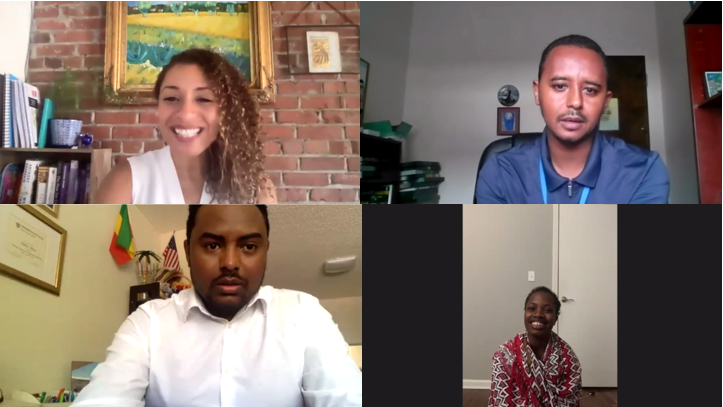This blog post includes perspectives from Isabelle Darling, Refugee Mental Health Clinical Lead, National Partnership for Community Training; Fasil Aragaw, Refugee Integration Specialist, Gulf Coast Jewish Family and Community Services; Dr. Tadios Assefa, Founder and President of the Board of Directors of the U.S. Africa Institute; and Angie Uwimana, Interpreter, Gulf Coast Jewish Family and Community Services.
In June 2021, Switchboard hosted a virtual training series on equity within resettlement services, concluding with a panel discussion featuring speakers from the African Diaspora. To honor Black History Month and continue to highlight voices of community members, this blog post highlights key takeaways from the conversation, which included questions on personal experiences, resettlement, and policy.
As the world continues to face the COVID-19 pandemic, the United States also faces the additional challenges of systemic racism and the pervasive impact it has on communities nationwide. After unnecessary deaths of Black, Brown, Asian, and LGBTQ+ community members, refugee service providers are seeking deeper understanding of the tangled intricacies of discrimination and the impact that U.S.-based oppression has on newcomers.
During the discussion, each panelist shared different layers of the resettlement experience through their leadership roles in the community and their own personal experiences. Ranging in age, experience, and length of time in the U.S, the panelists comprised a Congolese youth leader who has served as an interpreter after arriving in the U.S. less than five years ago; an Ethiopian journalist who currently serves as a case manager and integration specialist after five years of U.S. residency; and an Ethiopian organizer who now uses his doctorate to aid Black immigrants and refugees with policy and legal service provision. All shared that being a refugee leader and provider for newcomers gives them a sense of purpose:
“This job […] gives me comfort to work with refugees of all colors who have experienced a lot of ups and downs in striving to make it here in the U.S.” – Fasil Aragaw
As the panel discussion deepened, the topics of hardship and culture shock during resettlement arose. When refugees are positioned as leaders, this can help mitigate challenges experienced by newcomers, like accessing timely education certification; building a sense of belonging; and understanding cultural nuances unique to the U.S.
“There are a lot of expectations from refugees, and the way they picture the U.S., and the overall system is quite different than what is actually here. To help some realize what’s happening here and what they’re expecting is a big gap, and they need to narrow that gap as much as possible.” – Fasil Aragaw
The panelists continued to share how representation and positionality of minoritized groups like Black Americans also impact a newcomer’s understanding of race and racism. Refugees are regularly resettled in communities that are economically disadvantaged. These communities are commonly home to Black Americans who are facing a lack of infrastructural resources, leaving many without opportunities for upward mobility and with unmet mental health needs. If refugees do not experience Black Americans in positions of support, leadership, and guidance, it is understandable that false perceptions about Black Americans arise:
“When I came here and I met Black Americans, I was like, this is not my society. I belong to another society.” – Angie Uwimana
Fortunately, like many refugees, Angie’s perception changed over time as she gained more understanding. Similarly, Dr. Tadios Assefa uses his experience and perspective to guide the way community is being built between refugees and marginalized communities in the U.S.
“I predominantly work with Black immigrants and refugees and asylum seekers, and also a number of intersectional issues [and] Black liberation movements, like the Black Lives Matter movement, because it is very important to celebrate and recognize our ancestors, those who came before us, who gave us this opportunity, who fought for us.” – Dr. Tadios Assefa
While the resettlement field may still be determining its level of commitment to anti-racist and anti-biased frameworks, it must be acknowledged that newcomers are arriving at a critical intersection of U.S. history. The U.S. is facing its own determination to uphold the commitment to the tenet that “All men are created equal with certain unalienable rights.”
“It’s very sad to see what African Americans are given, especially those living under the low living standard. They are given few choices, and even those choices are not very good ones. And it seems like a similar kind of choice is given to refugees. It’s no longer just African American issues; it’s everybody’s issue to try to eliminate systemic racism, but it needs an organized movement. It needs people to be taught what’s happening, […] and to try to make a change in the system so that everyone can be benefit from this, honestly speaking, glorious and very rich country.” – Dr. Tadios Assefa
Whether through cultural orientation, other programs and services, or advocating for resource allocation for newcomers and their receiving communities, resettlement agencies have an opportunity to be change-makers. They also have an opportunity to aid refugees in becoming change-makers themselves. If resettlement agencies lose sight of how to show up as advocates, they only need to look to their current and former clients for guidance: these leaders are modeling more than self-sufficiency; they are forging a path towards American unity.
Interested in learning more? Check out Switchboard’s information guide Fundamentals of Equity and Resettlement: Understanding Social Identities in Resettlement Services and stream the accompanying two-part training series.










